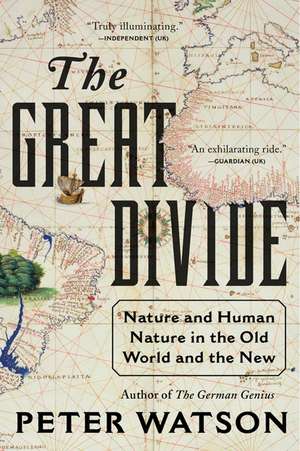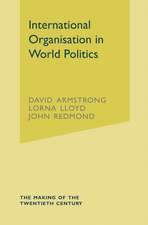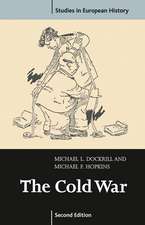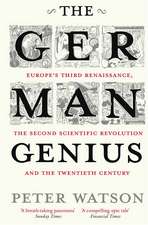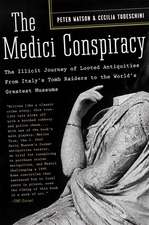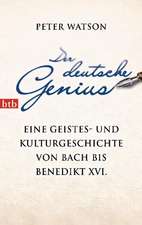The Great Divide: Nature and Human Nature in the Old World and the New
Autor Peter Watsonen Limba Engleză Paperback – 24 iun 2013
By 15,000 BC, humans had migrated from northeastern Asia across the frozen Bering land bridge to the Americas. When the last Ice Agecame to an end, the Bering Strait refilled with water, dividing America from Eurasia. This division continued until Christopher Columbus voyaged to the New World in the fifteenth century.
The Great Divide compares the development of humankind in the Old World and the New between 15,000 BC and AD 1,500. Combining the most up-to-date knowledge in archaeology, anthropology, geology, meteorology, cosmology, and mythology, Peter Watson’s masterful study offers uniquely revealing insight into what it means to be human.
| Toate formatele și edițiile | Preț | Express |
|---|---|---|
| Paperback (2) | 91.48 lei 3-5 săpt. | +56.52 lei 7-11 zile |
| Orion Publishing Group – 7 feb 2013 | 91.48 lei 3-5 săpt. | +56.52 lei 7-11 zile |
| HarperCollins Publishers – 24 iun 2013 | 114.42 lei 3-5 săpt. |
Preț: 114.42 lei
Nou
Puncte Express: 172
Preț estimativ în valută:
21.90€ • 23.78$ • 18.39£
21.90€ • 23.78$ • 18.39£
Carte disponibilă
Livrare economică 01-15 aprilie
Preluare comenzi: 021 569.72.76
Specificații
ISBN-13: 9780061672460
ISBN-10: 0061672467
Pagini: 640
Dimensiuni: 152 x 229 x 26 mm
Greutate: 0.64 kg
Editura: HarperCollins Publishers
Colecția HarperPerennial
ISBN-10: 0061672467
Pagini: 640
Dimensiuni: 152 x 229 x 26 mm
Greutate: 0.64 kg
Editura: HarperCollins Publishers
Colecția HarperPerennial
Textul de pe ultima copertă
Exploring the development of humankindbetween the Old World and the New—from15,000 BC to AD 1500—the acclaimed authorof Ideas and The German Genius offers agroundbreaking new understandingof human history.
Why did Asia and Europe develop far earlierthan the Americas? What were thefactors that accelerated—or impeded—development? How did the experiences of OldWorld inhabitants differ from their New Worldcounterparts—and what factors influenced thosedifferences?
In this fascinating and erudite history, PeterWatson ponders these questions central to thehuman story. By 15,000 BC, humans had migratedfrom northeastern Asia across the frozen Beringland bridge to the Americas. When the worldwarmed up and the last Ice Age came to an end,the Bering Strait refilled with water, dividingAmerica from Eurasia. This division—with twogreat populations on Earth, each unaware of theother—continued until Christopher Columbusvoyaged to the New World in the fifteenth century.
The Great Divide compares the developmentof humankind in the Old World and the Newbetween 15,000 BC and AD 1500. Watson identifiesthree major differences between the twoworlds—climate, domesticable mammals, andhallucinogenic plants—that combined to producevery different trajectories of civilization in thetwo hemispheres. Combining the most up-to-dateknowledge in archaeology, anthropology, geology,meteorology, cosmology, and mythology, thisunprecedented, masterful study offers uniquelyrevealing insight into what it means to be human.
Why did Asia and Europe develop far earlierthan the Americas? What were thefactors that accelerated—or impeded—development? How did the experiences of OldWorld inhabitants differ from their New Worldcounterparts—and what factors influenced thosedifferences?
In this fascinating and erudite history, PeterWatson ponders these questions central to thehuman story. By 15,000 BC, humans had migratedfrom northeastern Asia across the frozen Beringland bridge to the Americas. When the worldwarmed up and the last Ice Age came to an end,the Bering Strait refilled with water, dividingAmerica from Eurasia. This division—with twogreat populations on Earth, each unaware of theother—continued until Christopher Columbusvoyaged to the New World in the fifteenth century.
The Great Divide compares the developmentof humankind in the Old World and the Newbetween 15,000 BC and AD 1500. Watson identifiesthree major differences between the twoworlds—climate, domesticable mammals, andhallucinogenic plants—that combined to producevery different trajectories of civilization in thetwo hemispheres. Combining the most up-to-dateknowledge in archaeology, anthropology, geology,meteorology, cosmology, and mythology, thisunprecedented, masterful study offers uniquelyrevealing insight into what it means to be human.
Notă biografică
Cuprins
ENG
Recenzii
Watson gathers academic research from numerous disciplines into a comparatively reader-friendly form. THE HERALD 20130209 This is a fascinating doorstopper of a work THE SUNDAY BUSINESS POST 20130217 Watson's fascinating theme compares the two great populations in the Americas and the 'Old World', separated in 15,000 BC, when the ice Age ended and the Bering Strait land bridge became submerged. THE LADY 20130405
